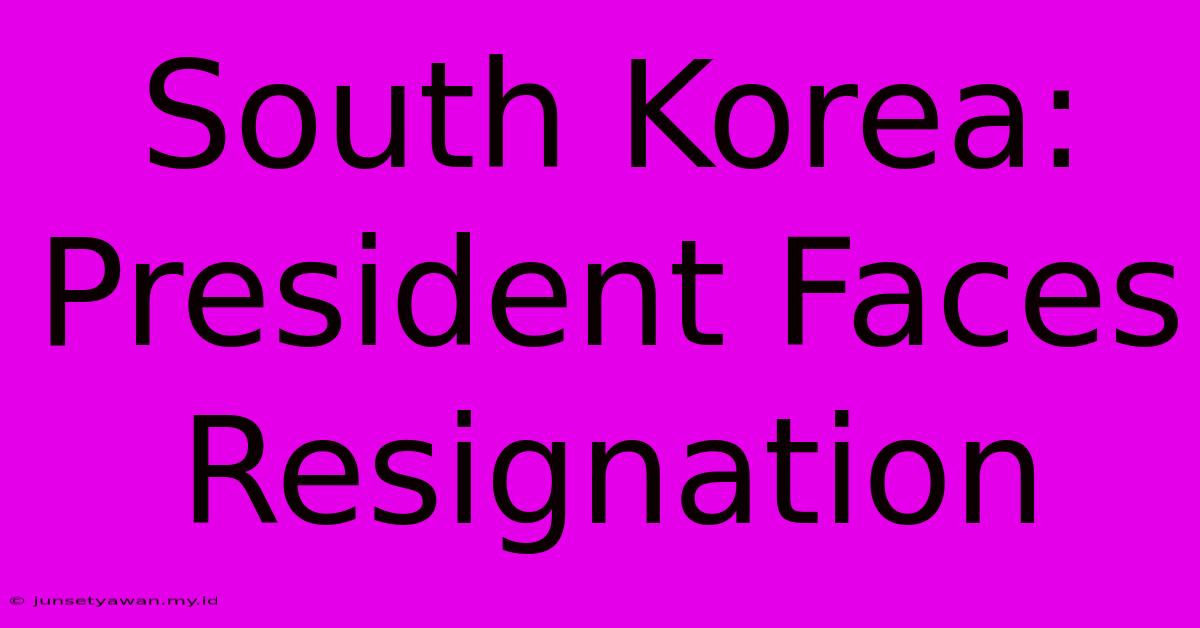South Korea: President Faces Resignation

Temukan informasi yang lebih rinci dan menarik di situs web kami. Klik tautan di bawah ini untuk memulai informasi lanjutan: Visit Best Website meltwatermedia.ca. Jangan lewatkan!
Table of Contents
South Korea's Presidential Crisis: Yoon Suk-yeol Faces Mounting Pressure
Meta Description: South Korean President Yoon Suk-yeol faces growing calls for resignation amidst multiple controversies. Learn about the political turmoil and its impact on the nation.
South Korea is currently grappling with a major political crisis, as President Yoon Suk-yeol faces intense pressure to resign. The mounting controversies surrounding his administration have sparked widespread protests and fueled calls for accountability. This article delves into the key issues driving the demand for the President’s resignation and analyzes their potential impact on South Korea’s political landscape.
The Key Controversies Fueling the Crisis
Several significant events have contributed to the current turmoil, significantly eroding public trust in President Yoon Suk-yeol and his administration. These include:
Allegations of Corruption and Abuse of Power
Numerous allegations of corruption and abuse of power within the presidential office have surfaced, leading to investigations and public outrage. These accusations involve close aides and appointees, raising concerns about cronyism and a lack of transparency within the government. The details of these allegations are still unfolding, but the sheer volume of accusations has fueled public distrust. This is not simply about individual cases; it's about the perceived systemic corruption within the government. The investigation into these claims will be crucial in determining the President’s fate.
Economic Challenges and Public Dissatisfaction
Beyond the scandals, economic challenges have further exacerbated public dissatisfaction with the President's handling of the nation's affairs. Rising inflation and the cost of living have left many South Koreans feeling economically insecure, adding fuel to the existing discontent. This economic hardship, coupled with the political controversies, has created a perfect storm of public anger directed at the presidency.
Strained Relations with North Korea
The delicate relationship with North Korea has also come under scrutiny. President Yoon Suk-yeol's approach to the North has been criticized by some as being too aggressive or lacking in diplomatic finesse. This has led to concerns about the potential for further escalation in regional tensions, adding another layer of complexity to the already challenging situation.
! Alt text: South Korean citizens protesting against President Yoon Suk-yeol's resignation
The Political Fallout and Potential Scenarios
The calls for President Yoon Suk-yeol's resignation represent a significant challenge to his authority and the stability of the government. The political consequences could be far-reaching, potentially leading to:
- Early Elections: If the President were to resign or be impeached, early presidential elections would likely be triggered. This would plunge the nation into further political uncertainty.
- Government Instability: The current crisis has already created a climate of instability, hindering the government's ability to effectively address pressing national issues.
- Impact on Foreign Policy: The turmoil could also impact South Korea's relationships with other nations, particularly its crucial alliances with the United States.
Several pathways could unfold in the coming weeks and months. The investigations into the various allegations, public opinion, and the actions of the National Assembly will all play a critical role in determining the ultimate outcome of this crisis. The pressure on President Yoon Suk-yeol to resign is immense, and the future of South Korean politics hangs in the balance.
Conclusion
The crisis surrounding President Yoon Suk-yeol’s presidency is a deeply concerning issue for South Korea. The allegations of corruption, coupled with economic hardships and concerns over North Korea policy, have created an environment ripe for political upheaval. The demand for his resignation signifies a major loss of public trust, and the path forward remains uncertain. Further developments in the ongoing investigations and the reactions from the National Assembly will be key to understanding the long-term consequences of this critical period in South Korean politics. Only time will tell how this significant challenge will reshape the country's political landscape. The future of South Korean leadership, and the stability of the nation, depends heavily on how this crisis is resolved.

Football Match Schedule
Upcoming Matches
Latest Posts
Terimakasih telah mengunjungi situs web kami South Korea: President Faces Resignation. Kami berharap informasi yang kami sampaikan dapat membantu Anda. Jangan sungkan untuk menghubungi kami jika ada pertanyaan atau butuh bantuan tambahan. Sampai bertemu di lain waktu, dan jangan lupa untuk menyimpan halaman ini!
Kami berterima kasih atas kunjungan Anda untuk melihat lebih jauh. South Korea: President Faces Resignation. Informasikan kepada kami jika Anda memerlukan bantuan tambahan. Tandai situs ini dan pastikan untuk kembali lagi segera!
Featured Posts
-
Triunfo De Racing Sigue En La Liga Profesional
Dec 04, 2024
-
Korea Selatan Chaos Hukum Militer Baru
Dec 04, 2024
-
Barcelona Vs Mallorca Raphinha Haus Gol
Dec 04, 2024
-
Rossoneri Taklukan Sassuolo 6 0
Dec 04, 2024
-
Seu Spotify Wrapped 2024 Passo A Passo
Dec 04, 2024
